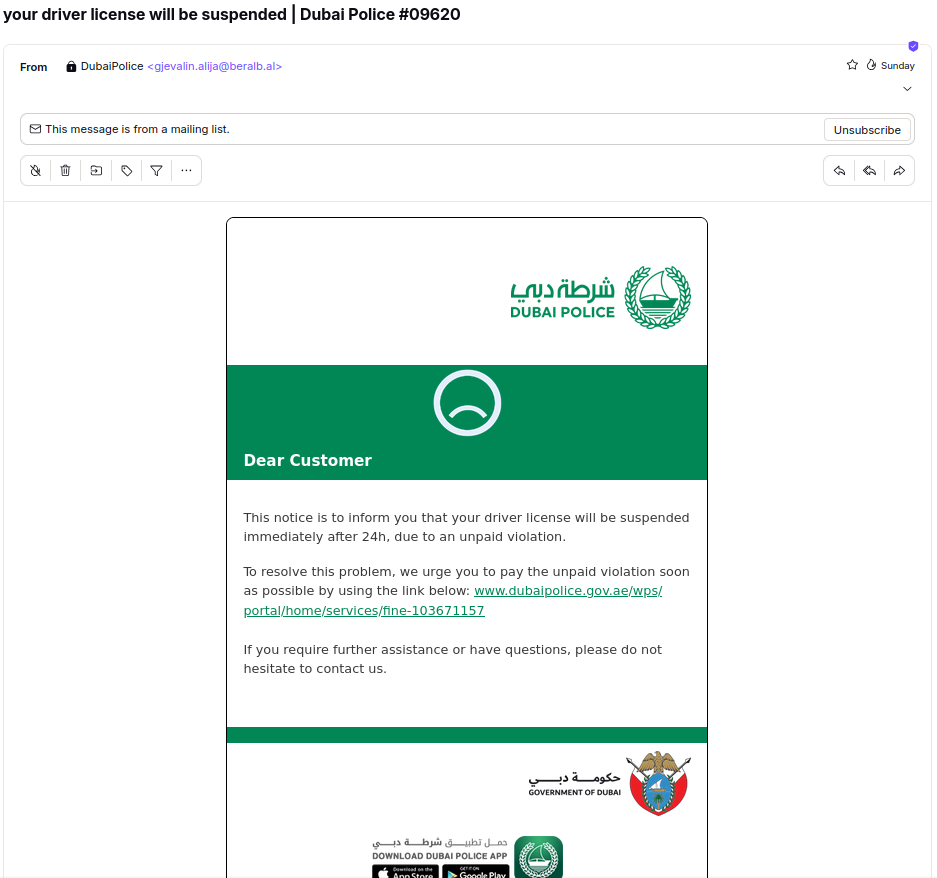A rising wave of cybercrime in the UAE has seen fraudsters impersonating law enforcement to extort money from unsuspecting residents. The highly organized scam has caused major financial losses, especially during the festive season. Here’s everything you need to know to protect yourself.
Law Enforcement Impersonation: A New Low in Cybercrime
Imagine receiving a call from someone claiming to be a Dubai Police officer, informing you of unpaid fines for traffic violations or license renewals. They sound convincing, with background noises mimicking a bustling police station. Before the call, you receive an official-looking message from “Dubai Police,” complete with a payment link. Under pressure, you pay—only to realize later that it was a scam.
This scenario has become alarmingly common in the UAE, as revealed by US based cybersecurity firm Resecurity. Fraudsters are using social engineering techniques, including phishing, smishing (SMS phishing), and vishing (voice phishing), to exploit public trust in law enforcement.
Why Now? Scammers Exploit the Festive Spirit
The surge in fraudulent activities coincides with the UAE’s Eid Al Etihad celebrations on December 2, a time when residents are typically relaxed and less vigilant. The Ministry of Human Resources and Emiratisation (MoHRE) has declared December 2 and 3 as paid holidays for private sector employees, creating the perfect storm for scammers to strike.
Dubai Police has issued warnings urging residents to ignore calls requesting financial information, reiterating that official agencies will never ask for such details over the phone.
How the Scam Works: Anatomy of the Deception
The fraudulent campaign is a well-oiled machine, designed to instill fear and confusion in victims. Here’s how it unfolds:
- Initial Contact: Victims receive a call from someone impersonating a Dubai Police officer. The caller uses scare tactics, warning about revoked licenses or seized vehicles unless immediate action is taken.
- Fake Notifications: Victims are sent messages or emails that appear to be from Dubai Police. These messages contain links to fake payment portals designed to look like government websites.
- Payment Demand: Victims are pressured into paying small fines. Once credit card details are entered, the fraudsters drain accounts or make unauthorized purchases.
- Sophisticated Social Engineering: Fraudsters often mimic official tones and use fake investigation numbers to make their claims appear credible. They use stolen data from the Dark Web to personalize their attacks, making them even harder to detect.
READ FULL REPORT HERE: Cybercriminals Impersonate Dubai Police to Defraud Consumers in the UAE – Smishing Triad in Action

Victim Speaks: A Chilling Account of Manipulation
One victim shared their experience with Resecurity, shedding light on the fraudsters’ tactics. During the call, the scammer, claiming to be “Captain Sheikh Abdul Aziz Ibrahimi,” asked the victim about their occupation and instructed them to check their inbox for a fake investigation file. The victim, confused and scared, almost fell for the ruse before realizing it was a scam.
The recorded conversation revealed the manipulative nature of the fraud, with the scammer repeatedly emphasizing that the call was being monitored by officers—a calculated move to intimidate the victim.
The Bigger Picture: Fraud’s Toll on the UAE
A report by the UAE Financial Intelligence Unit (UAEFIU) underscores the scale of the problem. Between 2021 and 2023, the UAE suffered financial losses of AED 1.2 billion (USD 326 million) due to fraud, with phishing, smishing, and vishing identified as the top threats.
The report highlights how these scams often fund larger criminal activities, including money laundering. With fraudulent campaigns becoming more sophisticated, the need for public awareness has never been greater.
The Smishing Triad: A Global Network of Fraud
This scam isn’t isolated to the UAE. Resecurity has linked the operation to a Chinese-speaking group known as the Smishing Triad, which has targeted countries worldwide, including the USA, EU, India, and Saudi Arabia. The group uses stolen databases to send up to 100,000 scam messages daily, leveraging compromised domain names and fake email addresses.
Their infrastructure includes domains registered in Oman, Albania, and China, with URLs designed to bypass spam filters. Some of these domains mimic government portals, tricking victims into providing sensitive information.
Indicators of Compromise (IOCs): What to Watch For
Resecurity has identified over 144 malicious domain names used by the scammers. These domains often have suspicious extensions like .icu, .site, .top, and .om. Residents are urged to avoid clicking on links in unsolicited messages and report suspicious domains to authorities.
ALSO READ : Call for Papers on AI/ML in Predictive Policing and Digital Forensics for FutureCrime Summit 2025
How to Stay Safe: Tips and Reporting Channels
Dubai Police and cybersecurity experts recommend the following precautions:
- Verify the Source: Always cross-check information with official government websites or agencies.
- Avoid Sharing Personal Details: Do not share sensitive information like banking details over the phone or through unsolicited messages.
- Look for Red Flags: Poor grammar, generic greetings, and unverified links are signs of phishing attempts.
If you suspect a scam, report it immediately:
- Dubai, Sharjah, Ajman: Call 901 for assistance.
- Abu Dhabi: Call 800-2626, send an SMS to 2828, or email aman@adpolice.gov.ae.
Protecting UAE Residents from Cybercrime
The UAE’s reputation as a global hub of safety and security is under threat from increasingly sophisticated cybercriminals. By staying informed and vigilant, residents can help protect themselves and their communities. The fight against fraud requires collective effort, with authorities, cybersecurity experts, and the public working together to outsmart scammers.
As Resecurity and Dubai Police emphasize: “When in doubt, check it out.” Stay safe, stay vigilant, and spread the word.
Follow The420.in on
Telegram, Facebook, Twitter, LinkedIn, Instagram and YouTube



